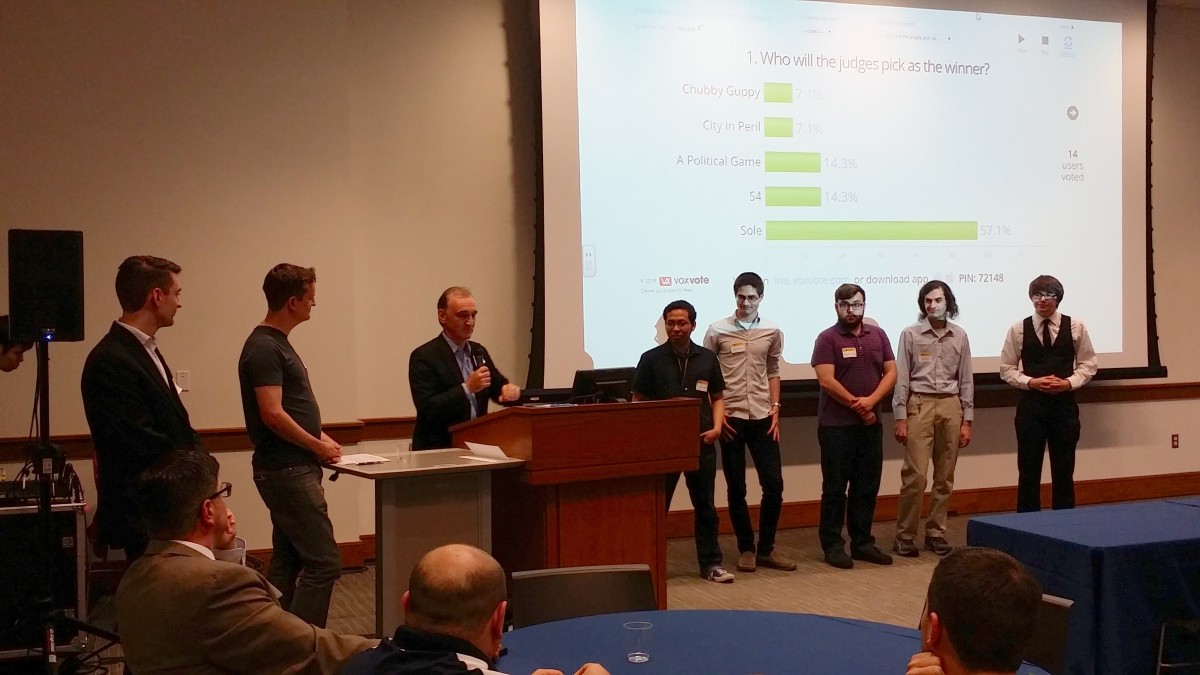For Drexel’s first Entrepreneurial Game Studio Pitch Competition, student dev teams needed to present their mobile games’ ideas, mission, goals, customer definition, resources and more — all in 10 minutes. It’s certainly a daunting task, especially considering that for many of these students it’s the first time they’ve pitched anything.
However, the stakes were real with a panel of three judges including Jake O’Brien, cofounder and developer at Flyclops; Chris Bennett, cofounder and director of sales and marketing at Skyless Game Studios; and this reporter deciding on the first- and second-place teams. The first-place team was awarded a seat at the coworking game development space Philly Game Forge, as well as a one-year subscription to Adobe Creative Cloud courtesy of the Charles D. Close School of Entrepreneurship.
This event transpired out of a partnership between the Entrepreneurial Game Studio and the Close School’s Laurence A. Baiada Institute for Entrepreneurship.
“This is really the first project that we put together to try and line up the programs and find a way to create value for what we’re doing here at Drexel in terms of entrepreneurship,” said Chuck Sacco, the Close School’s entrepreneur-in-residence and the Baiada Institute’s director.
Frank Lee, the founder and director of EGS, started off the event by reiterating EGS’s mission of fostering and retaining development talent in Philadelphia.
The hour of pitches was filled with interesting tidbits from all the teams — like how creative freedom is a motivator for the team behind “S4” and how a little brother’s infatuation with LEGO playsets influenced the main mechanic of “A City in Peril.”
After some Q&A and time for deliberation among judges, Gossamer Games’ “Sole” took first place with its ambitious, atmospheric concept for a mobile game while Team Aquarius’ “Chubby Guppy” and its quirky ideas (like fish laxatives) took second place.
“I think this is an awesome experience for students,” O’Brien said of the competition. “It’s making them have to think about what they’re doing from an entirely different angle which I think is a great way to give perspective to what they’re doing.”

Zach Howell pitched “A Political Game,” which was influenced by deception board games. (Photo by Albert Hong)
For Bennett, a Drexel alum in business administration with a concentration in entrepreneurship and marketing, he sees the value for students in learning how to pitch — especially for those wanting to go into game development full-time.
“You do need to have an idea of how your games are going to make money, honestly, pretty early on,” Bennett said. “So it’s awesome to see that that is starting to come together because that’s never been the case. I mean, there’s barely game education at all let alone game education plus business education, so it’s good to see that.”
Zach Howell, a fourth-year computer science major who co-ops at EGS, was impressed with the variety of pitches and appreciates the feedback he and his team had with “A Political Game.”
“I think it was really interesting to hear everyone else’s pitches and not just to see the different range of ideas but the different strategies everyone used to pitch,” Howell said.
For him and his team at Fox and the Little Prince, they plan to continue refining their first game, “Alchemia,” and identifying what they can “learn the most from and have the most fun making” for their next game, Howell said.
Tom Sharpe, a third-year game art and projection major and team lead for Gossamer Games, is excited about the opportunity to learn new things at the Game Forge and hoping to make “Sole” as great as it can be.
“For us, I think we’re most excited about getting to just talk with other developers about a lot of technical things that we don’t have a lot of experience in,” Sharpe said. “I know everyone on the team right now is very passionate about this project and it’s something we would love to make a full-time career for us. So for us, it’s not just a one-off side project — it’s more like us trying to really launch our careers using this as our first game.”
Before you go...
Please consider supporting Technical.ly to keep our independent journalism strong. Unlike most business-focused media outlets, we don’t have a paywall. Instead, we count on your personal and organizational support.
3 ways to support our work:- Contribute to the Journalism Fund. Charitable giving ensures our information remains free and accessible for residents to discover workforce programs and entrepreneurship pathways. This includes philanthropic grants and individual tax-deductible donations from readers like you.
- Use our Preferred Partners. Our directory of vetted providers offers high-quality recommendations for services our readers need, and each referral supports our journalism.
- Use our services. If you need entrepreneurs and tech leaders to buy your services, are seeking technologists to hire or want more professionals to know about your ecosystem, Technical.ly has the biggest and most engaged audience in the mid-Atlantic. We help companies tell their stories and answer big questions to meet and serve our community.
Join our growing Slack community
Join 5,000 tech professionals and entrepreneurs in our community Slack today!

The person charged in the UnitedHealthcare CEO shooting had a ton of tech connections

From rejection to innovation: How I built a tool to beat AI hiring algorithms at their own game

Where are the country’s most vibrant tech and startup communities?


